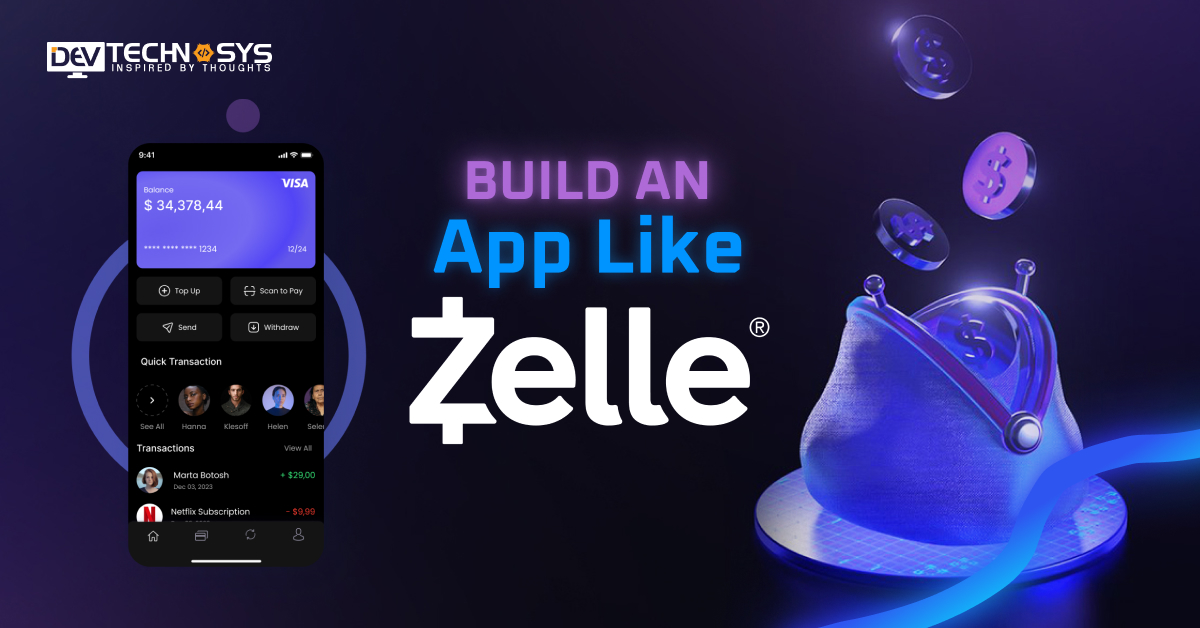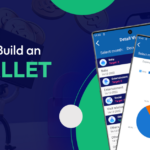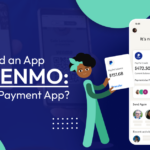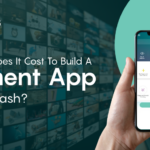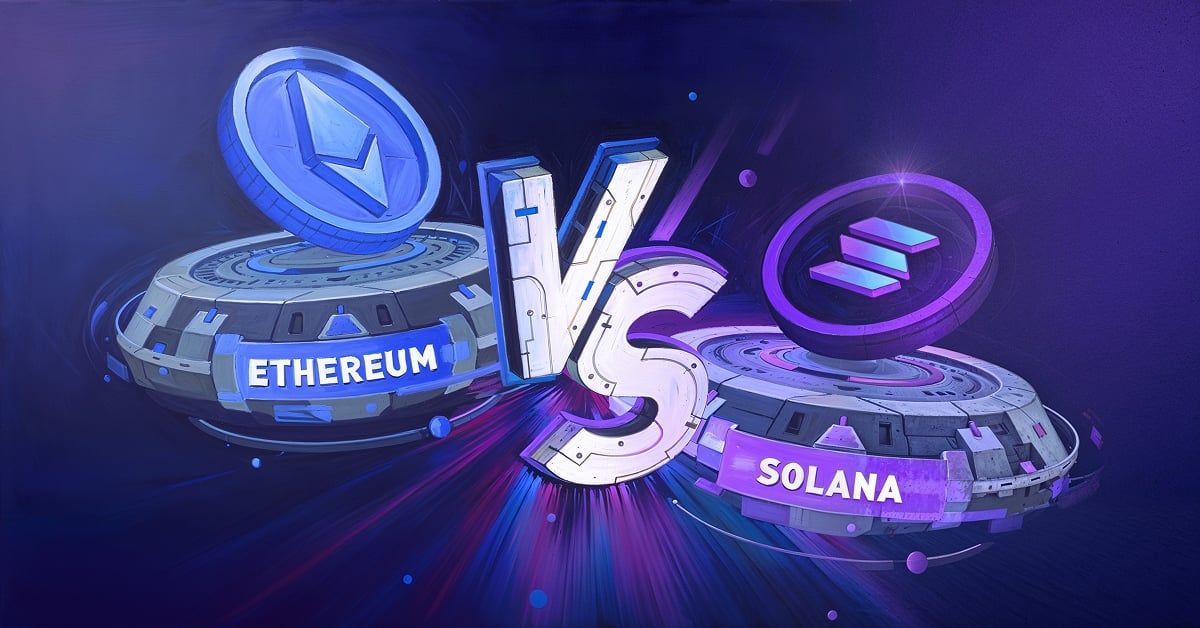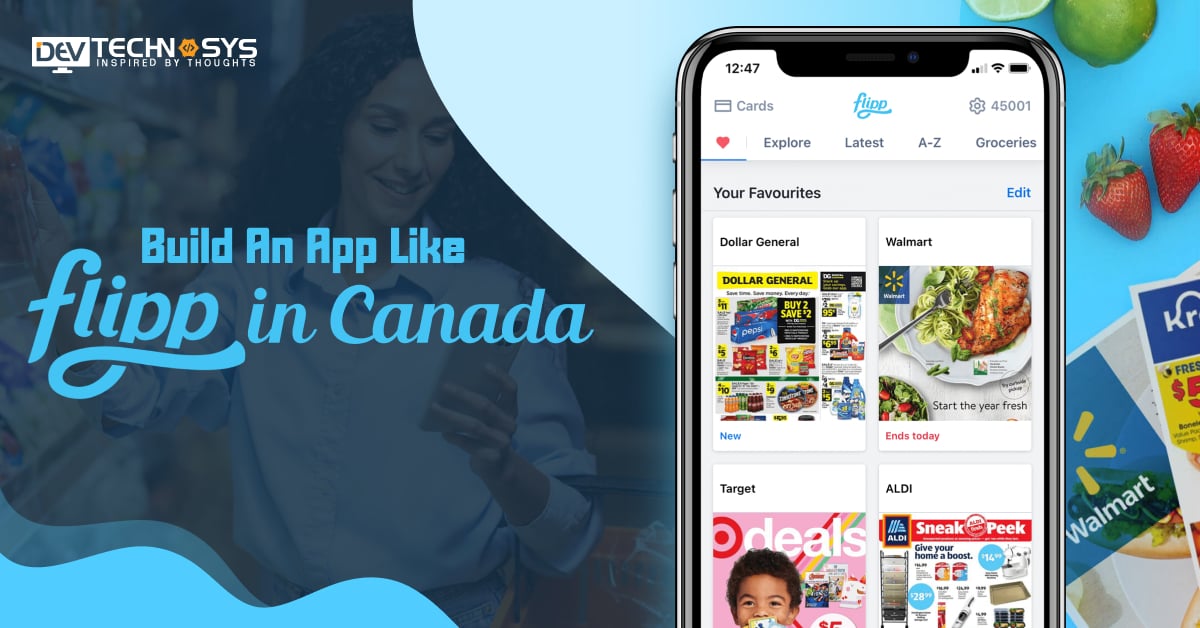“Real-Time Money Moves”
Have you ever sent money to someone really fast using your phone?
That’s what Zelle does, and it’s outstanding!
It lets people send and receive money in just a few seconds, no cash, no checks, and no waiting. Now, imagine if you could build an app just like Zelle! You could help people pay friends, family, or even buy things easily and safely.
It would work with banks and be really fast and secure. Building an app like Zelle might sound hard, but with the right tools and team, it’s totally possible.
People everywhere want fast payment solutions, and your app could be the next big thing!
So let’s get started with how to build an app like Zelle, features, cost, money-making opportunities, and many more.
What is Zelle?
Zelle is a mobile payment app that lets people quickly send and receive money between bank accounts in the United States. It gets rid of the need for cash or checks because it is linked directly to users’ bank accounts. An app like PayPal or Zelle is safe, free, and great for doing business with other people, like splitting bills, paying rent, or giving money back to family and friends.
- Instant Money Transfers
- Bank Integration
- No Fees
Current and Future Market Analysis of eWallet Applications
- There were 2 billion USD worth of e-wallets on the market in 2023.
- There will be a 10% compound annual growth rate (CAGR) in the market from 2024 to 2032.
- As per the analysis, the e-wallet applications market reached around $590.02 billion by the end of 2032.
- According to the global market, the biggest part of the market was in North America.
- The biggest part of the market was made up of retail and e-commerce.
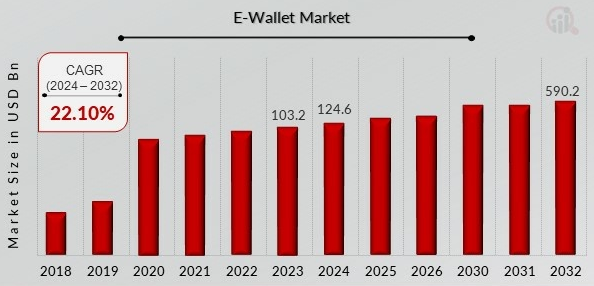
10 Best E-Wallet Apps Like Zelle
Check out the 10 best e-wallet applications like Zelle that make sending and receiving money quick, safe, and easy. These apps are great for making personal payments, splitting bills, and handling everyday digital transactions.
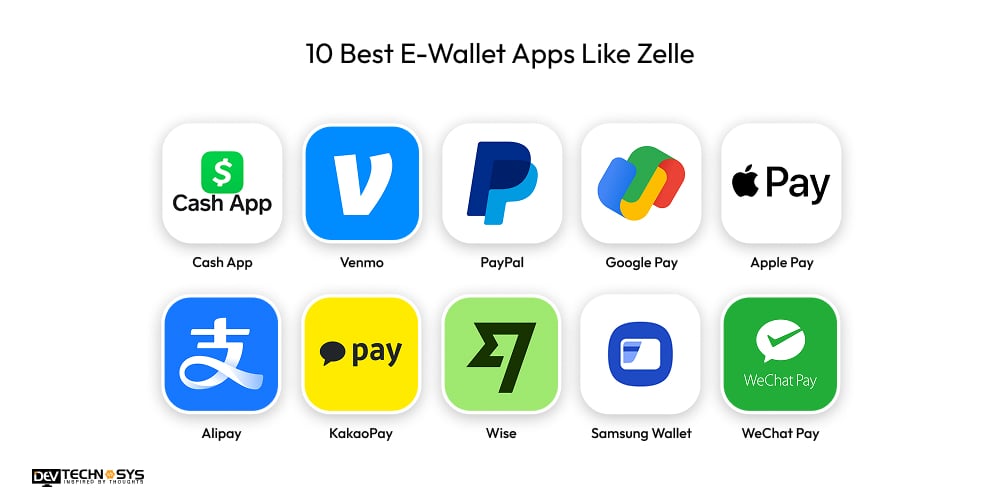
| App Name | Downloads | Stores Ratings | Launch Year | Platform Availability |
| Cash App | 57M+ | 4.7 | 2013 | iOS, Android |
| Venmo | 100M+ | 4.5 | 2009 | iOS, Android |
| PayPal | 500M+ | 4.4 | 1998 | iOS, Android |
| Google Pay | 200M+ | 4.6 | 2015 | iOS, Android |
| Apple Pay | 55M+ | 4.7 | 2014 | iOS |
| Alipay | 711M+ | 4.6 | 2004 | iOS, Android |
| KakaoPay | 10M+ | 4.4 | 2014 | iOS, Android |
| Wise | 10M+ | 4.5 | 2011 | iOS, Android |
| Samsung Wallet | 50M+ | 4.3 | 2022 | Android (Galaxy), Wear OS |
| WeChat Pay | 1B+ | 4.6 | 2013 | iOS, Android |
Why Today’s Entrepreneurs Want to Invest in E-Wallet App Development?
In today’s digital age, banking app development is rapidly gaining momentum among entrepreneurs, and for good reason.
These apps are revolutionizing the way people handle money, making transactions faster, safer, and more convenient. Here are five compelling reasons why entrepreneurs are eager to invest in this booming space:
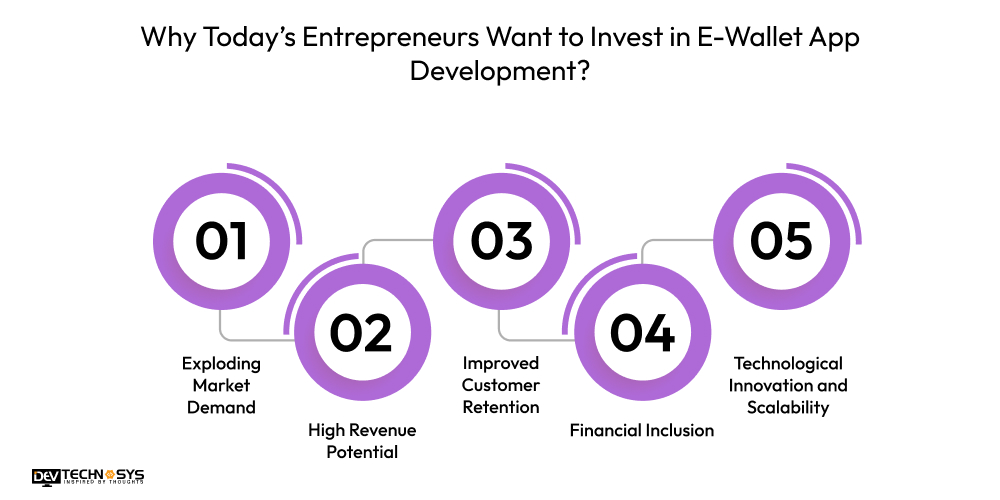
1. Exploding Market Demand
With the worldwide move toward cashless economies, banking applications like Chime have become vital. Users choose mobile wallets for everything, including online shopping and dividing dinner costs. Entrepreneurs perceive the rising user base as a huge opportunity to enter a high-demand sector.
2. High Revenue Potential
Transaction fees, premium services, merchant commissions, and adverts are all potential revenue streams for e-wallet apps. With millions of daily transactions, even a tiny charge per transfer may generate significant revenues.
3. Improved Customer Retention
The e-wallet app like Cash App, provides more than simply payments. Loyalty programs, cashback incentives, and integrated services (such as bill payments and ticket bookings) boost user engagement. These features assist to retain consumers and develop long-term customer connections, increasing brand value.
4. Financial Inclusion
Entrepreneurs are also motivated by the possibility of delivering digital financial services to underbanked communities. E-wallets can provide an entrance point for millions who do not have access to traditional banking, making it a socially responsible investment.
5. Technological Innovation and Scalability
Ewallet app development solutions has never been easier thanks to developments in APIs, encryption, and cloud technologies. Entrepreneurs can now create safe, scalable systems that include real-time transfers, biometric verification, and AI-powered fraud detection.
How AI Can Enhance the E-Wallet Apps Operations?
- AI enables real-time fraud detection by analyzing transaction patterns, reducing unauthorized activities and protecting user funds instantly and accurately.
- Personalized financial insights powered by AI help users manage spending habits and optimize budgets through tailored recommendations and alerts.
- AI-driven chatbots provide 24/7 customer support, quickly resolving queries and improving overall user satisfaction without human intervention.
- Voice recognition AI allows users to execute transactions hands-free, enhancing accessibility and convenience within the e-wallet app.
- Machine learning models continuously improve app security by detecting new threats and adapting defenses faster than traditional methods.
7 Robust Steps to Build an App Like Zelle
Discover the essential steps to build a secure, fast, and user-friendly money transfer app like Zelle. From market research to launch, learn how to create a competitive fintech solution that users trust. So, here we provide the e-wallet mobile app development process:
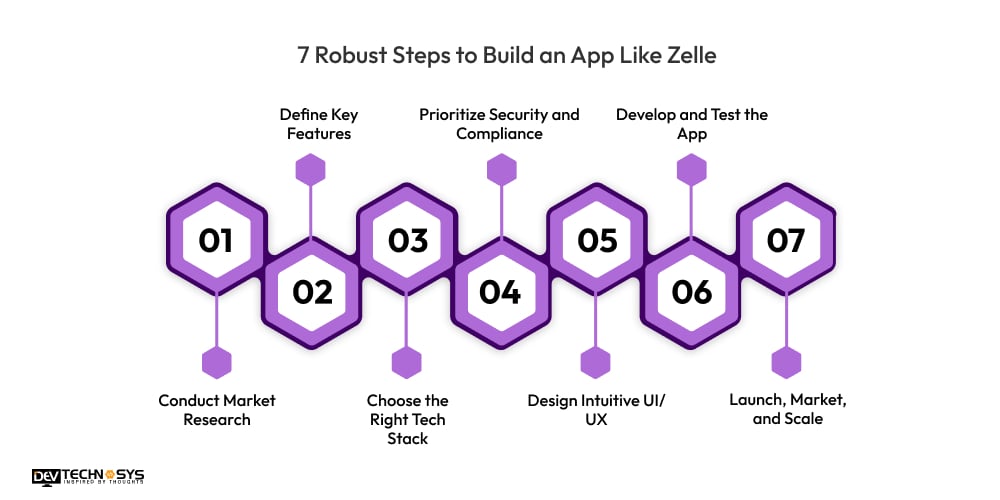
1. Conduct Market Research
Let’s begin to create an e-wallet app like Zelle, study digital payment trends, user needs, and competitor features like Zelle, Venmo, and PayPal.
Hire mobile app developers to analyze user pain points, regional regulations, and technology expectations to shape your app’s unique value proposition. Solid research ensures your product aligns with customer demand and complies with financial regulations from day one.
| Who are my top competitors? |
| What are users saying about Zelle and similar apps? |
| What problem does my app solve? |
2. Define Key Features
List essential features: user registration, bank account linking, instant transfers, transaction history, notifications, and robust security protocols. Consider adding extras like bill splitting or QR code payments. Prioritize functionality, simplicity, and mobile-first design to deliver a seamless user experience that mirrors Zelle’s speed and convenience.
| What is the core function of the app? |
| Should users be able to link multiple bank accounts? |
| Should users receive transaction notifications? |
3. Choose the Right Tech Stack
In the third stage to build an app like Zelle, select technologies suited for high-speed transactions, security, and scalability. For the backend, consider Node.js or Python with databases like PostgreSQL.
Use Swift/Kotlin for native apps or Flutter for cross-platform. Hire dedicated developers to choose APIs for bank integrations and ensure your tech stack supports real-time processing and secure data handling.
| Should we build native or cross-platform apps? |
| What backend language best supports real-time transactions? |
| What tools ensure data encryption and security? |
4. Prioritize Security and Compliance
Moving to the fourth stage to develop an e-wallet app like Zelle, incorporate encryption, two-factor authentication, and secure APIs. Ensure compliance with financial regulations like PCI DSS, KYC, AML, and GDPR.
Partner with legal experts to handle data privacy and security standards. Strong security builds trust, keeps users safe, and protects your platform from fraud and data breaches.
| How will we protect user data? |
| Is end-to-end encryption implemented? |
| What methods will we use for fraud detection? |
5. Design Intuitive UI/UX
In the fifth paypal app development step, create a user-friendly, visually clean interface that simplifies money transfers, account management, and transaction tracking. Use familiar patterns and ensure accessibility for all users.
Focus on responsive design and minimal clicks for key actions. A seamless, beautiful design boosts user satisfaction and sets your app apart.
| What is the primary action users should take? |
| How many steps are required to send money? |
| Does the design follow platform (iOS/Android) guidelines? |
6. Develop and Test the App
In the sixth stage to build an e-wallet app like Zelle, start with an MVP including core features like registration, linking accounts, and sending money. Use agile methodology for iterative development.
Rigorously test for bugs, security flaws, and UX issues on all devices. Regular QA ensures the app is reliable, responsive, and ready for real-world use.
| Have we built a clear Minimum Viable Product (MVP)? |
| Are we testing on all target devices and platforms? |
| Is there automated testing for security and functionality? |
7. Launch, Market, and Scale
Hire a professional mobile app development company to deploy the app on iOS and Android. Use targeted digital marketing to reach early users. Gather feedback to improve performance and features.
Scale infrastructure to support growth. Offer responsive support and regular updates. A successful launch with strong marketing and feedback loops builds trust and drives adoption.
| Is the app fully tested and stable for launch? |
| What marketing channels (social, ads, PR) will we use? |
| How will we handle app updates and bug fixes? |
10 Simple and Advanced Features of E-Wallet Apps Like Zelle
These features work together to deliver a fast, secure, and convenient payment experience, making e-wallet apps like Zelle increasingly popular worldwide.
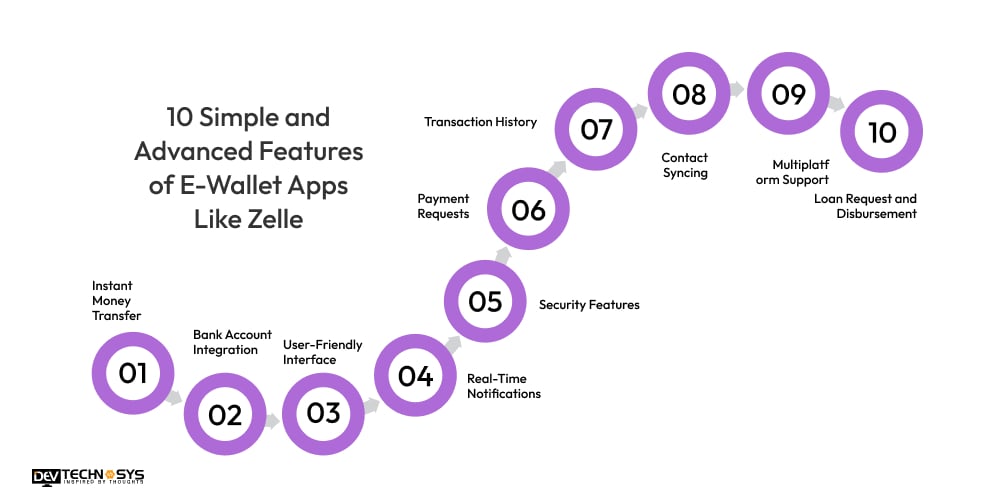
1. Instant Money Transfer
Apps like Google Pay allow customers to deposit and receive money across bank accounts fast, frequently in seconds, making transactions simple and convenient.
2. Bank Account Integration
Securely connects users’ bank accounts or debit cards to the app, allowing for convenient financial transfers without the need for cash or physical cards.
3. User-Friendly Interface
Zelle alternatives allow users to effortlessly use the app, making purchases or requests with minimum effort.
4. Real-Time Notifications
Users receive quick alerts when payments are paid, received, or requested, keeping them informed and in control of their transactions.
5. Security Features
Zelle clone app offers security features such as encryption, two-factor authentication, biometric logins, and fraud detection, which are used to secure user data and financial transactions.
6. Payment Requests
The eWallet Android app allows Users to quickly request money from friends and family, making it easy to divide bills or reimburse costs.
7. Transaction History
The similar app like Zelle allows users to track their spending and manage their finances by keeping detailed records of previous transactions.
8. Contact Syncing
Zelle clone app use phone contacts to easily discover and pay individuals without manually inputting bank information.
9. Multiplatform Support
Wallet apps like Freecharge, available on iOS and Android smartphones and often incorporated directly into bank apps, offer flexibility and accessibility.
10. Loan Request and Disbursement
Zelle alternatives allow users to apply for small personal loans directly within the app, with instant approval, transparent terms, and quick disbursement into their wallet balance.
What is The Cost to Build an App Like Zelle?
The cost to develop an app like Zelle typically ranges from $8,000 to $25,000 or more, depending on features, complexity, and development region. Key factors influencing the e-wallet app development cost include real-time money transfer functionality, bank integrations, robust security measures, and compliance with financial regulations.
Additional expenses arise from UI/UX design, backend infrastructure, testing, and ongoing maintenance. Choosing a skilled development team and clear project scope helps manage costs while delivering a reliable, secure payment app.
| E-Wallet App Development | Estimated Cost | Time Frame |
| Normal App Development | $8000 – $12000 | 2 to 6 Months |
| Mid-Complex App Development | $14000 – $19000 | 6 to 8 Months |
| High-Complex App Development | $25000+ | 9+ Months |
5 Key Factors That Can Affect the E-Wallet App Development Cost
Key things that affect how much it cost to build an ewallet app: Learn how the general budget for creating a safe and easy-to-use e-wallet app is affected by things like features, security needs, platform selection, design complexity, third-party integrations, legal compliance, the location of the development team, and support plans.
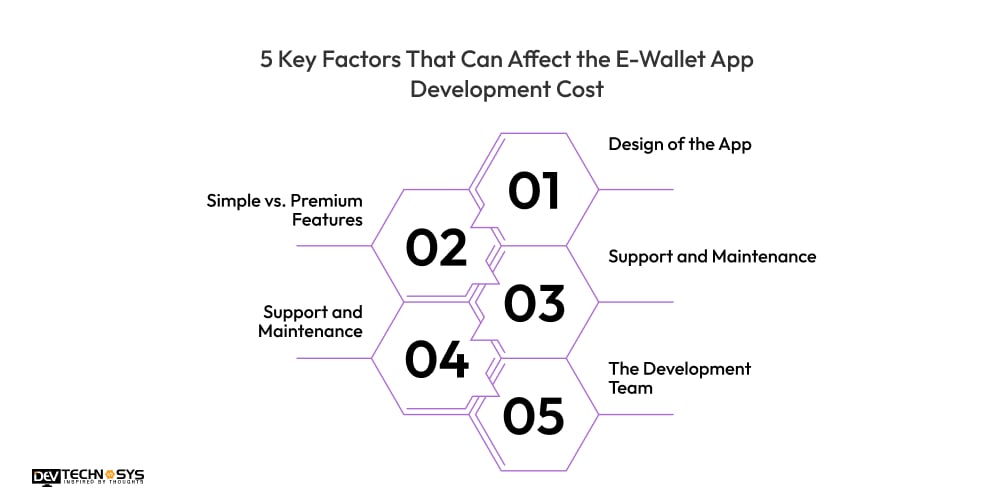
1. Design of the App
The application’s design has a substantial influence on development costs. A basic, clean interface is less expensive, but bespoke visuals, animations, and sophisticated user flows take more time and effort.
Intuitive UX/UI design improves user engagement while increasing design and development work, raising the overall Zelle app development cost.
| Design Type | Description | Estimated Cost (USD) |
| Basic Design | Template-based, minimal customization | $3,000 – $7,000 |
| Custom UI/UX Design | Unique interface, branding, and animations | $8,000 – $15,000 |
| Responsive Design | Mobile and desktop optimization | Included in UI/UX cost |
| Prototype & Testing | Wireframes, user testing, iteration | $2,000 – $5,000 |
2. Simple vs. Premium Features
Basic functions, such as user registration and basic transfers, are less expensive, but adding premium functionality, such as biometric verification, real-time analytics, multi-currency compatibility, and loyalty programs, necessitates more development time and experience. The amount and complexity of features have a direct impact on ewallet mobile app development cost.
| Feature Type | Description | Estimated Cost (USD) |
| Simple Features | Send and receive money, Transaction history | $5,000 – $8,000 |
| Premium Features | Biometric authentication, Multi-currency support, QR code payments | $7,000 – $12,000+ |
3. Support and Maintenance
Ongoing support and maintenance are essential for app stability, security upgrades, and feature improvements.
Budgeting for frequent bug patches, server administration, and customer support provides a good user experience, but these services incur continuous expenses after initial ewallet app development services.
| Support Level | Description | Estimated Cost (USD) |
| Basic Support | Bug fixes, minor updates | $500 – $1,500 |
| Advanced Support | 24/7 monitoring, feature updates | $2,000 – $5,000 |
| Security Updates | Regular vulnerability patches | Included in support |
| Customer Service | Dedicated helpdesk and user assistance | $1,000 – $3,000
|
4. Development of the Backend
The backend manages data processing, server logic, and third-party integrations. Building a secure, scalable backend with APIs for bank connectivity, payment gateway integration, and encryption necessitates expert developers and infrastructure investment, which can drastically increase the total Zelle app development cost.
| Backend Complexity | Description | Estimated Cost (USD) |
| Basic Backend | User auth, database, API | $8,000 – $12,000 |
| Advanced Backend | Real-time sync, cloud integration, third-party APIs | $10,000 – $16,000 |
| Scalability Features | Load balancing, distributed servers | $5,000 – $10,000
|
| Security Measures | Encryption, backups, GDPR compliance | $5,000 – $8,000
|
5. The Development Team
The e-wallet app development cost varies depending on the team size, location, and experience. Hiring a local, experienced workforce is frequently more expensive than outsourcing offshore.
A trained workforce promises quality, faster delivery, and fewer difficulties, but requires a larger budget. Balancing cost and quality is critical for successful development.
| Team Composition | Description | Estimated Cost (USD) |
| Small Offshore Team | Junior/mid developers, minimal PM | $8,000 – $15,000 |
| Experienced Local Team | Senior developers, UI/UX designers, QA, PM | $15,000 – $20,000+ |
| Freelancers | Individual experts, variable quality | $5,000 – $14,000 |
| Full In-House Team | Dedicated full-time staff | $20,000+ annually |
How to Generate Money From E-Wallet Apps Like Zelle?
E-wallet app like Brigit or Zelle have revolutionized digital payments by offering quick, secure, and convenient money transfers. While many users enjoy fee-free transactions, developers and entrepreneurs need effective revenue models to monetize their apps. Here are five proven ways to generate income from e-wallet apps like Zelle:
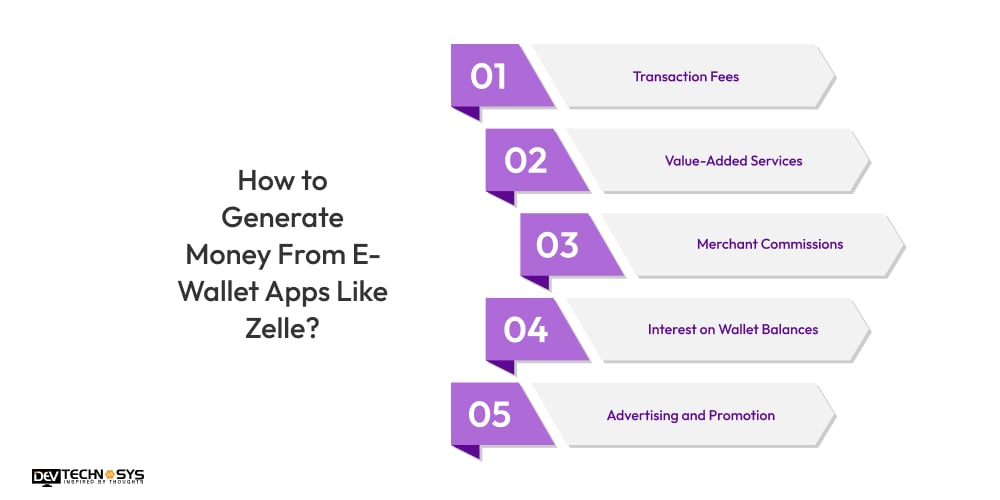
1. Transaction Fees
Charging a modest fee for some transactions, such as fast transfers to non-linked bank accounts or cross-border payments, is a popular income stream. While many basic transfers are still free, premium or faster services might justify prices without discouraging consumers.
3. Value-Added Services
If you create a mobile app like Zelle, it offer premium features like as sophisticated analytics, budgeting tools, and better security choices might be offered on a subscription basis to attract power users who are ready to pay for convenience and greater capability. This generates recurrent money and builds user loyalty.
2. Merchant Commissions
Integrating with merchants and allowing users to pay directly through the app gives potential for commissions on sales. Partnering with retail businesses, restaurants, or service providers can result in consistent income streams for each transaction handled through the app.
5. Interest on Wallet Balances
If the app stores user funds (as with prepaid wallets), companies can earn interest on the total sum. This passive income necessitates strict regulatory compliance but may be a considerable revenue stream, particularly with a big user base.
4. Advertising and Promotion
If we develop an e-wallet app like Paytm, it includes targeted adverts, sponsored deals, and cashback incentives from partners. This strategy produces revenue from ad placements while offering users discounts or prizes to encourage more participation.
Conclusion
Finally, build an app like Zelle, it needs careful planning, strong security, a smooth user experience, and smart merging of features. If you work with an expert eWallet app development company, your app will be made with the newest technology, security standards, and the ability to grow in mind. Expert e-wallet app developers can help you turn your idea into a safe and easy-to-use digital payment system from market research to launch and beyond. Putting money into professional growth is important if you want to stand out in the financial field and meet users’ growing needs.
Frequently Asked Questions
Q1. How Much Does It Cost To Build an App Like Zelle?
The cost to develop an app like Zelle ranges from $8,000 to $25,000+, depending on features, design complexity, security requirements, platform choice, and development team location.
Q2. How Much Time Does It Take to Create an App Like Zelle?
To create an app like Zelle typically takes 3 to 6 months, depending on the app’s complexity, features, design, testing requirements, and whether you’re building for one platform or multiple platforms.
Q3. What Type of Technologies Are Used to Make An App Like Zelle?
To make an app like Zelle, utilize technologies such as Swift or Kotlin for mobile development, Node.js or Python for the backend, cloud services (AWS or GCP), banking APIs, encryption protocols, database systems, and AI for fraud detection and personalization.
Q4. Do I Need to Partner with Banks to Launch An App Like Zelle?
Yes, partnering with banks or financial institutions is essential to enable direct account-to-account transfers, ensure compliance with financial regulations, and gain user trust through secure, regulated access to banking infrastructure and payment networks.
Q5. Will My App Need Ongoing Maintenance and Support?
Yes, your app will need ongoing maintenance and support to fix bugs, release updates, enhance security, ensure compatibility with new devices, and provide customer assistance, ensuring smooth performance and a positive user experience over time.
